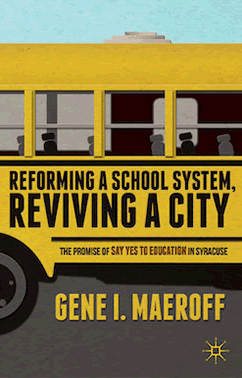BOOK REVIEW
Reforming A School System, Reviving A City: The Promise of Say Yes to Education in Syracuse
Reviewed By Merri Rosenberg
 Reforming A School System, Reviving A City: The Promise of Say Yes
to Education in Syracuse
Reforming A School System, Reviving A City: The Promise of Say Yes
to Education in Syracuse
By Gene I. Maeroff
Published by Palgrave Macmillan, New York: November 2013: 228 pp.
School reform, with its promise, challenges, and disappointments, is a perennial topic for academics, journalists and other experts who seek that magic bullet for system-wide transformation.
One miraculous concept was Syracuse’s idea that offering qualified public high school graduates free tuition to more than 100 colleges and universities would be enough to alter both the school system’s, and the city’s, fortunes. Syracuse, a declining city of about 145,000 people with a student enrollment of almost 20,000 students, was the beneficiary of the New York City foundation, Say Yes to Education Inc, which offers scholarships.
In this engrossing volume, which deftly mingles anecdotes about students with profiles of school and city administrators, as well as teachers; classroom observations; scholarly reports, and comparisons to other programs and cities, even a lay reader is rapidly caught up in Syracuse’s story.
It helps that the author, Gene Maeroff, is as good as it gets. Former national education correspondent for the New York Times, and a senior fellow at the Carnegie Foundation for the Advancement of Teaching, he is also the founding director of the Hechinger Institute on Education and the Media at Teachers College, Columbia University. He knows his stuff, and perhaps even more important, knows how to share it in a way that matters to his audience.
Maeroff makes it clear that the problems Syracuse faces, with a largely minority public school population, many of whose families live in poverty, weren’t simply economic. As he writes, “Years after the program started, some residents still did not understand that Say Yes was about a lot more than the scholarships. Say Yes intends to make post-secondary school affordable and –just as important—give students the grounding and aspiration to keep them there, once admitted, thereby leading to the completion of degrees.”
To make it work, the schools needed the support of local businesses and government, which got on board, and additional services such as health clinics, social workers, even legal assistance for students’ families. The district made the school day and the school year longer, and provided even more staff development to be sure that teachers were up-to-date with Common Core standards.
Even though the focus of the Say Yes initiative is on high school graduation and college admission, the Syracuse experiment is very much a “whole district” effort, which is what enticed superintendent Sharon Contreras to move from a position as chief academic officer in Providence to Syracuse. Towards that end, in Syracuse, Say Yes has slowly evolved into what Maeroff calls a “wraparound program that … strives to fill the gaps in children’s lives.” #
